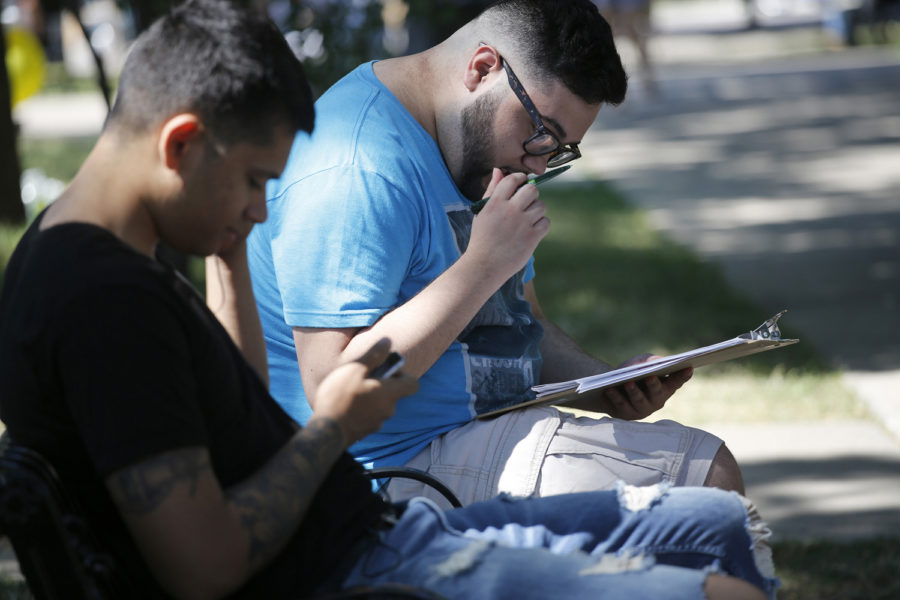NextGen voters turned away at polls
Michael Tercha/Chicago Tribune/TNS
Abigael Medina, 19, of Chicago, registers for voter information with NextGen Climate Illinois at the Logan Square Centennial Monument in Chicago on July 16, 2016.
November 19, 2018
On election day, students waited for hours in lines stretching out the doors of the William Pitt Union, Soldiers and Sailors and other campus polling locations — only for some to be turned away when they made it to the front.
For many students, living on campus means having to change their address for voting. During PittStart dates and move-in week, an organization called NextGen America tabled on campus, offering students moving in for the year the opportunity to register to vote before the midterm elections or change their address to reflect their campus residency. However, some students who registered through NextGen were not able to partake in the polls.
Allie Staman, a first-year nursing major, was one of the students who registered on campus. She had already registered to vote at home in Delaware, but decided to submit forms through NextGen to vote in Pittsburgh.
“At PittStart this summer, there was a group inside of Towers lobby that had voter registration papers and said that we could register to vote in Pittsburgh and that all we had to do was fill out the paper and they would take care of the rest,” Staman said. “This was supposed to be my first time voting.”
NextGen America, a progressive political organization, registered more than 38,000 voters throughout the Pennsylvania before the midterm elections. The organization was founded in 2013 as NextGen Climate by billionaire Tom Steyer. Today, their platform includes climate protection, equal rights, health care and immigration.
Despite its progressive ideology, NextGen’s voter registration movement is nonpartisan, as required by law. Julia Ackerley, NextGen’s Pennsylvania organizing director, told the Bucks County Courier Times that the organization would spend $3.5 million to register young voters in the state for midterm elections. The day before election day on Pitt’s campus, NextGen brought an ice cream truck with free ice cream for students who said they were going to vote. And on election day, they had a table on the sidewalk in front of Wafflonia giving away free pizza to students who voted.
Through NextGen’s Youth Vote program, they tabled on several college campuses to register students. According to the Pittsburgh City Paper, only Penn State had more students than Pitt register to vote with the organization.
Victoria Vinall, NextGen’s Pennsylvania state media manager, said every form the organization receives is audited and physically handed in to the county registrar’s office.
“We take the voter registration process very seriously and have a full audit system to ensure accountability,” Vinall said in an email. “The mission of our organization is to expand the electorate and give young people the tools to vote, and we work really hard to ensure every student gets registered.”
NextGen’s voter registration drives were on campuses all over Pennsylvania. However, Pitt students weren’t the only ones who had difficulties on election day — several Lehigh University students who registered with NextGen also discovered on Election Day that they were not actually registered to vote on campus, according to Lehigh’s collegiate paper The Brown and White.
Some Pitt students who discovered they weren’t registered tried to remedy the problem by submitting a provisional ballot. Faith Crawford, a first-year nursing student, also submitted a change of address form through NextGen during her PittStart date this summer. She didn’t know she wasn’t registered to vote at her school address until she went to Soldiers and Sailors to vote on election day and was told she wasn’t on the list.
Crawford said the judge of elections searched for her voting registration on the electronic polling book, where eligible voters for each polling site are listed. It was on the site that Crawford discovered that she was still registered at her home address, hundreds of miles away. She went to the Allegheny County Office of Elections, where they tried to get a court order to change her address, but was unable to as she was not previously registered inside the county.
“Later that day, I submitted a provisional ballot, but I wasn’t 100 percent sure it would be counted,” Crawford said.
Voters who registered to vote in Pennsylvania but aren’t on their polling location’s roster have the right to submit a provisional ballot. Provisional ballots are similar to normal ballots, but they are not counted until the county elections office determines that you are eligible to vote.
For Staman, she only realized she wasn’t registered after her roommate received a voter registration card in the mail and she didn’t. The night before the election, she used the electronic polling book but was unable to find herself. A family member found her name in the polling book at their local polling site in Delaware, instead.
Vinall said once NextGen turns over its paperwork, they have no way of finding out the status of registration for the voters.
“Unfortunately, once we turn the forms in to the registrar, there’s no way for us to follow up on how or whether they are processed correctly or on time. Therefore, it’s hard for us to know why some registrations don’t go through,” Vinall said in an email.
For Staman, discovering that she was unable to vote after she submitted the correct paperwork was a disheartening experience.
“I was incredibly disappointed and frustrated that I wasn’t able to vote,” Staman said. “I have been incredibly excited to vote since I turned 18 and not being able to partake was a huge let down.”
The Allegheny County Office of Elections could not be reached after multiple attempts for comment.








